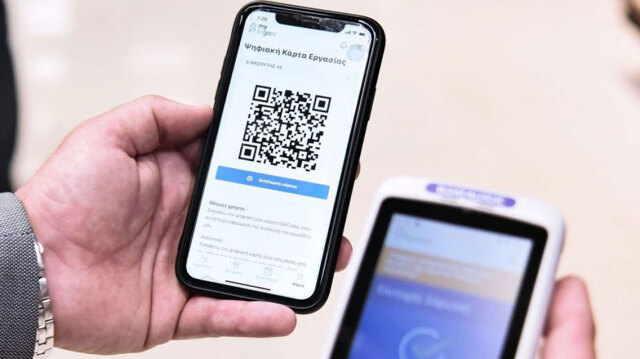To boost the efficiency and accountability of public servants, the government is taking further action following the public evaluation results and internal assessments utilizing AI tools. According to information from “THEMA,” the Ministry of Interior, in collaboration with the Maximou Mansion, plans to implement a digital job card across the public sector by 2026.
With the increasing adoption of digital job cards in various private sectors, Interior Ministry officials believe this can seamlessly translate to public services. Key challenges include adhering to the project timeline and enhancing professionalism in the public sector, drawing inspiration from multinational corporations. It’s worth noting that while the digital job card is already in use by several independent authorities, such as AADE, and in private legal entities—ensuring compliance with working hours and protecting employees from arbitrary practices—it is set to be expanded to all civil servants.
The new digital card will allow civil servants to clock in and out using modern technology, with all movements recorded. This will enable management to monitor overtime and ensure adherence to official working hours, which some have previously disregarded. The existing system, where civil servants manually punch in and out, has led to creative workarounds used by some personnel over time.
Identifying “Loopholes”
The cleverness of certain civil servants in exploiting gaps in the current system has prompted the Interior Ministry to explore new solutions to guarantee that working hours are strictly followed.
It’s well-known that some civil servants simply stamp their cards upon arrival before exiting the building, only to return later. Others have been found using their office as a base for personal errands during working hours. Additionally, there are cases where officials have sent colleagues to punch their cards on their behalf, despite not being present.
Recognizing human needs, the public sector accommodates staggered hours for employee arrivals and departures, allowing flexibility such as:
• Arrival at 07:00, departure at 15:00.
• Arrival at 07:30, departure at 15:30.
• Arrival at 08:00, departure at 16:00.
• Arrival at 08:30, departure at 16:30.
• Arrival at 09:00, departure at 17:00.
Incentive for Timeliness
The clever tactics of some individuals are becoming less effective in an era of AI, as the public service seeks modernization. There exist disparities across various state departments. While some utilize electronic time tracking systems, others rely on a mix of electronic and handwritten processes, with some still abiding by solely handwritten logs. Many institutions, due to their geographic dispersion, lack centralized electronic oversight on time management, leading to reliance on paperwork for staff leave requests.
Encouraging results from the private sector’s digital card implementation indicate high compliance and clearer declarations of overtime, prompting the Interior Ministry to advance this initiative. Officials emphasize that punctual civil servants stand to benefit from the new digital system through potential overtime opportunities and protection against unprofessional practices by colleagues. As highlighted by competent sources, transitioning to a digital timekeeping system will include necessary adaptations in the Public Employees Code, as well as considerations for personal data protection, steering towards a comprehensive digital profile for public servants.
Assessments and Goals
The upcoming measures to monitor working hours for civil servants follow a recent introduction of target setting that informed the internal assessments for 2024. The government’s recently released data showcases a substantial decrease in the number of civil servants rated as excellent—plummeting from over 143,000 in 2019 to just above 15,000 in 2024 under the new measurable standards. This reflects a significant shift in assessment conditions, with only 37% of supervisors deemed highly competent, down from 89%. Notably, the identification of low-performing employees rose from 237 in 2019 to over 2,000 in 2024, yet nearly €30 million in productivity bonuses were awarded to 19,500 qualified civil servants surpassing their targets this year.
Officials from the Interior Ministry note that the new target setting brings tangible benefits to citizens as well. In social security, pending supplementary pension applications have been reduced by 75%, and 90% of citizen requests were processed via the Single Call Centre (1555) and the gov.gr platform. For municipal authorities, average response times for requests have improved to within 20 days, with a goal to further enhance this by 2025.
Additionally, the Ministry of Interior will establish a new Public Human Resources Disciplinary Council, consisting solely of full-time state legal council officials, with plans to tighten the disciplinary framework. Finally, the platform axiologisi.ypes.gov.gr is anticipated to reopen in November for the second round of a large-scale public opinion survey, following an initial response from nearly 65,000 citizens in May.
Photos.
Ask me anything
Explore related questions

















